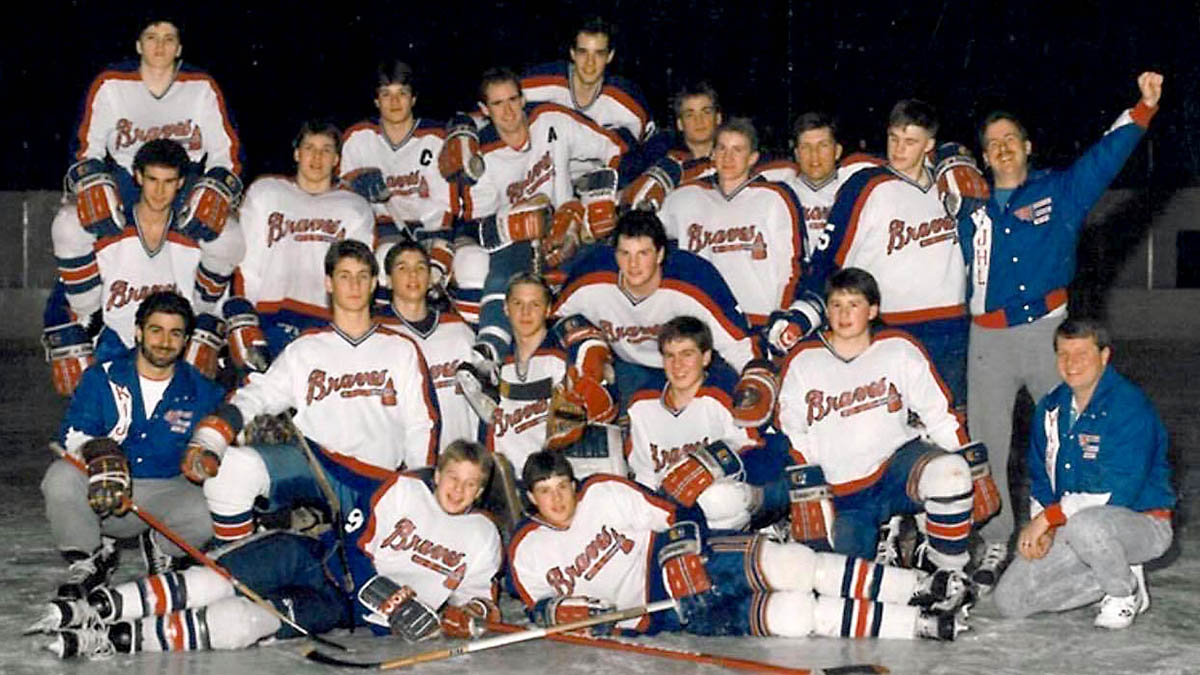The wait to celebrate the Spokane Braves 50th anniversary season in the Kootenay International Junior Hockey League in 2023-24 is almost over.
The Braves will celebrate the milestone during their third home game when the 100 Mile House Wranglers visit the Eagles Ice Arena on Friday, Oct. 13. The Braves had their home opener on Sept. 29, the same night as the WHL’s Spokane Chiefs, in front of 350 fans. It was their first home game in 1,307 days. They had 400 fans the next afternoon against Columbia Valley.
“We’re going to recognize Spokane and returning,” said Bob Tobiason, who took over ownership with the intention of developing young men into good people.
It’s a fantastic feeling for Tobiason after three years.
“I’m more excited for the kids than anything. Our little area needs this team,” said Bob, 74, who purchased the organization in the summer of 1989 to keep it in the community as there was a chance it would leave.
“Spokane needs that. We’re a good hockey town,” he said. “I just wanted to do it and keep it going here.
“To me, hockey is the second part of that. It’s just building young men for the future,” he said. “It’s so fun to watch these kids strive to go further. We get a lot of players who advance to college. We have had some make the NHL (Derek Ryan, Scott Parker and Scott Levins are just a few). My sons have friends to this day from when they started playing hockey. It’s just a big family.”
His proudest accomplishment with the Braves is seeing what players are able to do after playing a key role in their development.
“We have a grinders organization and just about every guy in that organization has come through the Braves. It’s neat seeing that,” said Bob. “Their kids now are starting to come up and play. That’s why I like seeing Derek Ryan and these guys who played for us go and reach their dreams. That kind of stuff is so rewarding.”
The dreams of some Braves have also been realized through the Chiefs, more recently Bear Hughes, who was drafted by the Washington Capitals and this summer signed with the Las Vegas Golden Knights AHL affiliate, the Henderson Silver Knights.
The Chiefs come and watch certain players.
“It’s been a work in progress. We have a product they like, and if we have anybody, we can say, ‘Hey, come and look at this guy.’ They come up and there are no issues. That’s a good feather for us.”
The Braves are key to Spokane hockey families who love the option of their kids playing at a high level at home.
“The KIJHL is such a well recognized league and it is scouted all the time,” said Bob. “There are many opportunities for the kids here. It just needed to be here.”
Bob’s sons Bobby and Keith got the chance to play for the organization they idolized, known as the Flames (1975-85). Now Bob’s grandson Cameron Oien is the next family member to play coming from the Spokane Jr. Chiefs U18 program last season.
“We have a couple of pictures hanging in the rink, when he’s a little mite. There is a picture of me out there with him. It’s great and now to see him play, it’s fantastic.”
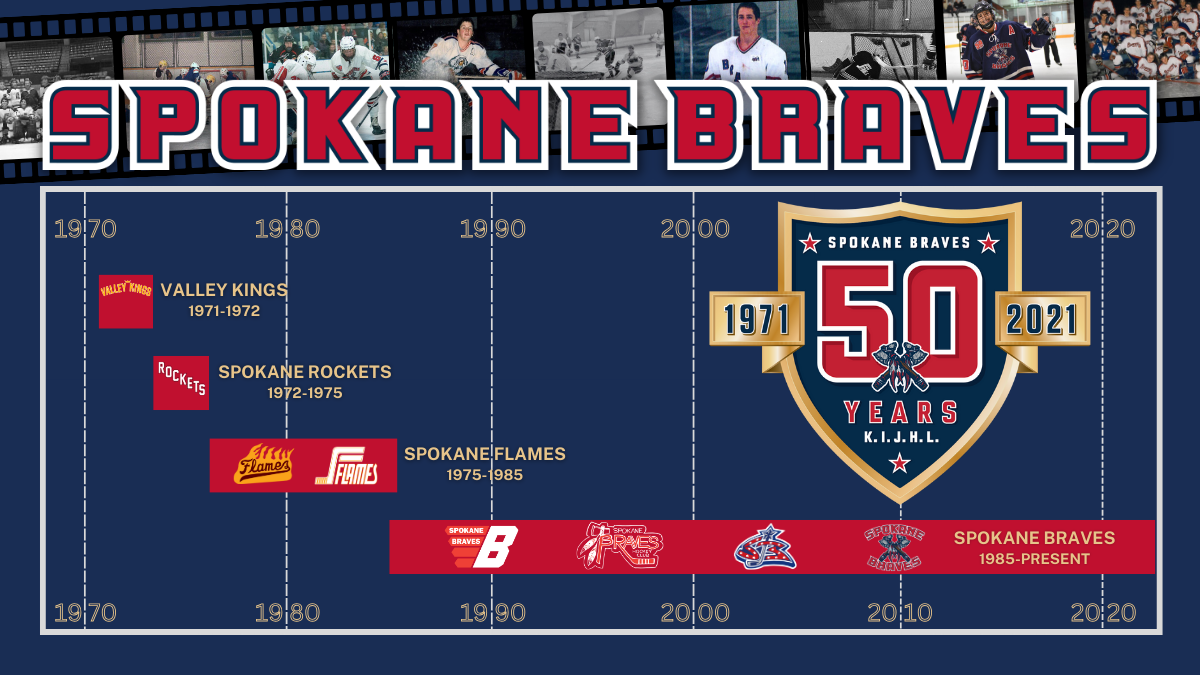
Cameron Oien
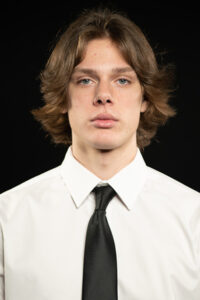 Playing his first junior hockey season for the Braves is “awesome” for Oien, who grew up watching games and looking up to players. His father Jay played for the Braves and wore No. 9, which he will wear as he wore it throughout his minor hockey days.
Playing his first junior hockey season for the Braves is “awesome” for Oien, who grew up watching games and looking up to players. His father Jay played for the Braves and wore No. 9, which he will wear as he wore it throughout his minor hockey days.
Getting the opportunity to “put on that jersey is definitely special and humbling” he said.
Oien loved watching the high level game and seeing the fast pace.
“The big hits were always eye-opening, fun to watch,” he said.
The 6-0, 170-pound forward put up big numbers for the Junior Chiefs, 88 points in 25 games, but he views himself as a two-way player. He focuses on the defensive zone as much as excelling in the offensive area. Oien loved watching now retired Boston Bruin Patrice Bergeron and how he played in the defensive zone.
“He was able to make good plays on both sides of the puck. My favourite player is Patrick Kane. His stickhandling and awareness in the offensive zone was super fun to watch. I try to learn from him and how he moves the puck in the offensive zone.”
Bobby Tobiason | Braves alum – 1987-92
As mentioned earlier, playing for the Braves was always the goal for Bobby, who watched the teams during his youth when it was the Flames. He watched players close to his age and older and always wanted to play with them.
“Having the opportunity to play alongside those guys, it really built a brotherhood – that camaraderie through our youth program,” said Bobby, who played five seasons and faced retired NHLer Adam Deadmarsh from Beaver Valley. “When you become a junior, there are tons of people in the stands to watch you play.”
A firefighter for three decades, the highlight of Bobby’s Braves career was playing in the KIJHL Final against Nelson in 1991-92. It was a hard year dealing with several injuries, including one that kept him out of the final against Nelson, which they lost in Game 7.
“It really sucked because I had been a producer as well as a good defender,” said Bobby, who played defence. “That team was just incredible.”
To Bobby, the KIJHL has always been such a great stepping stone for players to move on and have great careers.
“I know we have had our trials and tribulations over the years. We always want to be here and be a productive member of the league,” he said. “It’s super important to our family as well as the league and it’s an important thing that we continue to watch this league grow. Now that the league is Junior A, I think that is a big step for our kids with that next opportunity to move on to college down the road.
“I hope to follow in my dads shoes and keep the club alive for the next 50 years,” Bobby added.
Keith Tobiason | Braves alum – 1997-02
“It was a really cool experience” for Keith to play four seasons for the Braves.
“Growing up, we idolized everything with my dad being involved with the team,” said Keith, 41, a goal scorer for the Braves. “I started out as a water and stick boy and to end up being the guy to play there was pretty special. The hockey community is super tight.”
Pulling the Braves jersey over his head meant a lot, “it was almost an indescribable feeling” especially with his father owning the team and Bobby playing.
“When I was growing up, that was it, you wanted to go play for the Braves,” he said. “A lot of guys wanted to continue on and go further.”
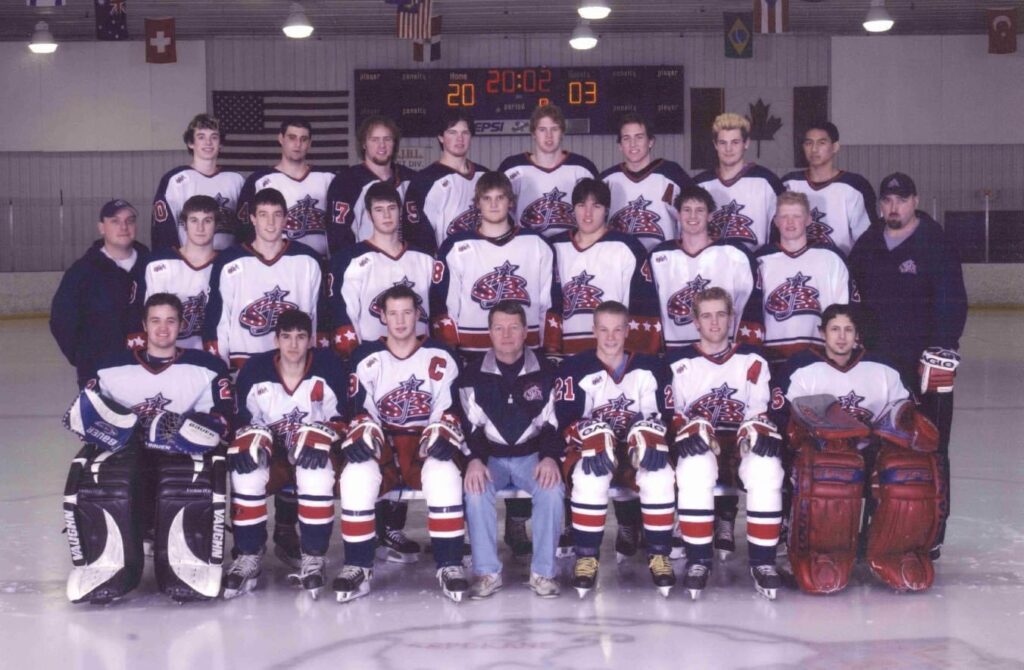
Derek Ryan (Edmonton Oilers) | Braves alum – 2002-04
Ryan credits playing for the Braves and in the KIJHL as a major stepping stone in his physical and mental development as a hockey player. It was his first time playing against older competition coming into the league as a 14- or 15-year-old.
“When you come in that young, playing against older guys that are more physically developed, it just forces you to mature a little bit,” said Ryan, 36, playing in his seventh full NHL season, and third with the Oilers. “I know it helped me to grow my game, learn to protect myself and how to play at a high pace. I have a lot of fond memories of my time there and learning how to be a junior hockey player, which served me well as I moved on to play in the Western Hockey League and many leagues from there.”
What Ryan also enjoyed about his Braves’ tenure was playing with his childhood friends and making new friendships. It was one of the factors leading him to play for the Braves. Another factor was head coach Michael Bay, who coached him one season in the Spokane minor hockey system.
“He knew the game well and I appreciated the way he coached and demanded a lot out of his players,” said Ryan, a few days before heading back to Edmonton to get ready for a new NHL season. “He held everybody accountable and at the end of the day, that’s what I love from a coach. That’s what I think most players need and Mike is no different than any other coach at the junior or minor hockey level. You are trying to develop hockey players of course, but people before that. When you hold people accountable, you have high expectations for them, and they begin to develop high expectations for themselves.”
Ryan is a proud Braves alum as the organization has helped several players move on to higher levels. He said that’s special and looking back, there’s a lot of players that played on those Braves teams he played on that were elite. Growing up in minor hockey, they were the best players in their state or region.
“Going to play for the Braves in the KIJHL is a pretty special thing,” said Ryan. “I feel really special and blessed to make it as far as I have. Not many guys get to make it to the NHL. I cherish that.”
Michael Bay | Former Braves Head Coach
“Twenty-plus years ago he was an old-school mentality coach, maybe a Darryl Sutter comparison for modern day as I can get,” said Derek Ryan on the huge impact Bay made on him.
Bay had been part of the Braves since 1993-94 and was an assistant coach under George Talotti. He spent 16 seasons as a head coach over two stints and what he loved about his time are the small communities they traveled to. Growing up in Seattle, he didn’t experience that.
“The atmosphere was so cool and just how those people supported their team,” said Bay, who works at a machine shop in Spokane operating a laser cutting machine. “They are kind of the only show in town. Terry Jones has been a great mentor for me, Simon Wheeldon was great, Brad Fox, the Ohlhausens. The people I was privileged to meet along the way made a difference in my life, not just as a hockey coach, but as a person.”
Bay also loved being part of the players’ journey, for some including a desire to play at a higher level.
“The fun part for me is finding out that they have kids now. A lot of them are coaching,” he said. “That’s what you want right.”
As a coach, Bay wanted his teams to play hard and always outwork the opponents, “even if we were less talented.”
Bay recruited younger players, but had experienced players who wanted to help mentor their teammates to reach the next level.
“That was always our approach. We wanted guys who wanted to play at a higher level,” said Bay. “A lot of times, the older guys did want to do that. I think we always matched or beat anyone’s compete level when we played.”
What Bay is most proud of is simply being part of the Braves and the KIJHL.
“It was so much more fun a second time. Letting go and not being the old-school way like my coaches were. I got to know the players,” he said. “I really enjoyed it a lot more. I appreciate the Tobiasons and everyone that came before me. It was a privilege to be a part of that league, not just the Braves. It was always about the league to me more than the Braves. It’s a unique opportunity for an American kid to be able to play in this league.”
Scott Levins | Spokane Braves – 1987-88
Scott Levins recalls watching Braves games as a kid with his father and brother and getting the chance to play for the Braves was “very fun.”
Levins, 53, always wanted to play for the Braves and got his chance as a senior in high school, which he credits to helping his junior hockey career. From Spokane, he went to Penticton, then the Western Hockey League and was drafted by the Winnipeg Jets.
“I pretty much owe everything to the KIJHL and the Spokane Braves. Without them, I don’t know what I would have done,” said Levins, who played 124 NHL regular season games with the Jets, Florida Panthers, Ottawa Senators and a brief stint with the Phoenix Coyotes. “I was not developed enough or good enough to play junior A as a 17- or 18-year- old kid.”
In Levins’ lone season with the Braves, he had 49 goals and 108 points in 42 regular season games. He still holds the Braves’ record for highest points-per-game average at 2.57. Levins wasn’t aware of that stat.
“I’m assuming because back when I played, it was just high scoring games,” he said. “It was a shootout every night, 8-6, 7-5. That probably helped me because nowadays when I watch junior hockey, it seems like everyone is a little more defensively responsible.”
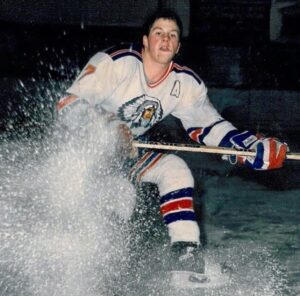
Levins took time to learn how to play junior hockey and was put on a line with local Tim Holden. Things clicked between them and it “just worked out. Both of us ended up having really good offensive years.”
“I was a grinding forward that would work hard, play physical, but I also liked scoring,” he said. “Making an impact on the scoreboard was a big motivator for me. I was probably a two-way forward that could play centre or wing.”
That season helped him in many ways, mentally, physically and learning to play the junior game against older, experienced players. He also loved playing with his friends, especially those he played minor hockey with – Holden and Brian Piper, a defenceman, who is the Braves graphic designer.
Playing in the NHL was “just a dream come true.”
“I really still can’t even believe I got a chance to play in the NHL,” said Levins. “My goal was always to play a professional sport growing up. I played baseball, football, basketball, when kids played multiple sports. I just wanted to be a pro athlete and it happened that hockey took over when I was in my later teen years. I was a late developer. It took me a few years of learning the pro game in the American Hockey League, in Moncton, New Brunswick. When expansion came in, I was selected by Florida and that gave me the opportunity to play in the NHL.”
Levins says it’s amazing that the Braves are celebrating 50 years.
“I remember growing up playing against Dallas Drake, and Dane Jackson,” he said. “Lots of guys came out of that league that ended up in the NHL for many, many years. It’s good to see the league is still going strong.”
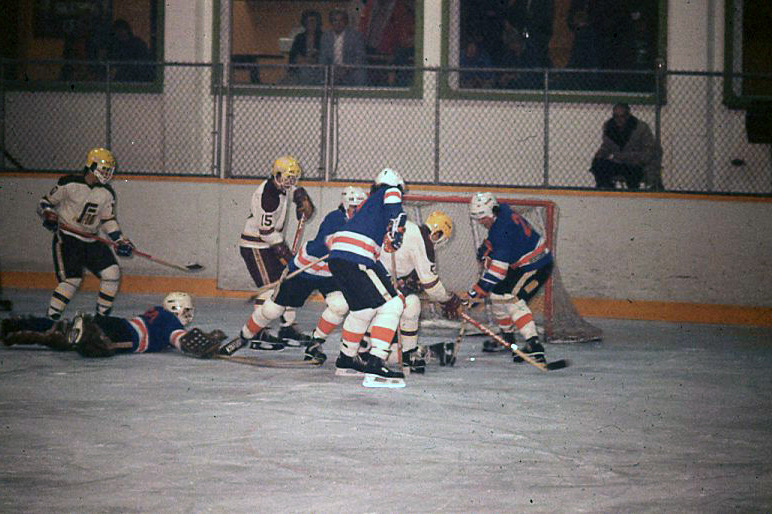
George Talloti – Flames Coach 1982-83 | Braves 90-91 to 93-94
“I just love coaching. I love spending time with kids,” said Talotti, who got into coaching the Flames and Braves because of Buddy Bodman and also coached his sons on the team. “I had always coached after I finished playing. It was just the logical thing to do.”
Talloti coached to give Spokane kids something. When he retired from playing, there were many talented players, but he didn’t feel they had the coaching. It was important for him to make a positive impact as a coach to help the players develop their skills.
What he’s proud of that he accomplished was keeping good players playing.
“I used to tell the kids right at the start, how many of you guys want to go on in hockey? How many of you guys want to be hockey players? Some kids would put up their hands,” he explained. “You guys are going to get treated differently than these guys. These guys are here just to have fun and play. You guys that want to play, I’m going to be on you to do things the right way.”
Talloti helped several players achieve their goals of reaching higher levels, including former NHLer Scott Parker, who won a Stanley Cup with the Colorado Avalanche.
“He was their tough guy and when he played here, he wasn’t,” said Talloti, who found Paker to be very coachable. “He was just a big, strong kid. He wanted to be Mr. Finesse. I told him, when Kelowna drafted him, they didn’t draft you to go out there and be Mr. Finesse. They drafted you because you are 6-3 and 220 pounds.”
The style that Talloti’s teams played was dictated by the players he had.
“When I first took over, we had a pretty physical team, but I had some really skilled players like Rodney Poindexter, who played for Penticton and then Northern Michigan,” said Talotti, 78. “We played a little bit of both back then – more of a tougher team.”
Talloti was a hard-nosed defenceman during his playing days as he “came from the physical, old-style hockey.”
“If I was coaching my way all the time, that’s the way it would have been,” he said. “If you don’t have the kids for it, you can’t do that. You have to coach what you have.
“The problem I had is that everybody associated me with toughness because that’s the way I played,” he continued. “I didn’t coach that way when I didn’t have those types of players.”
To Talloti, team success came from the players getting along and being there for each other. That’s how he had to play during his days and “I had to be the guy that did the dirty work and support everybody else.”
“I believed in that type of hockey,” he said.
Under Talloti, the Braves played for the KIJHL league championship in 91-92, losing to Nelson.
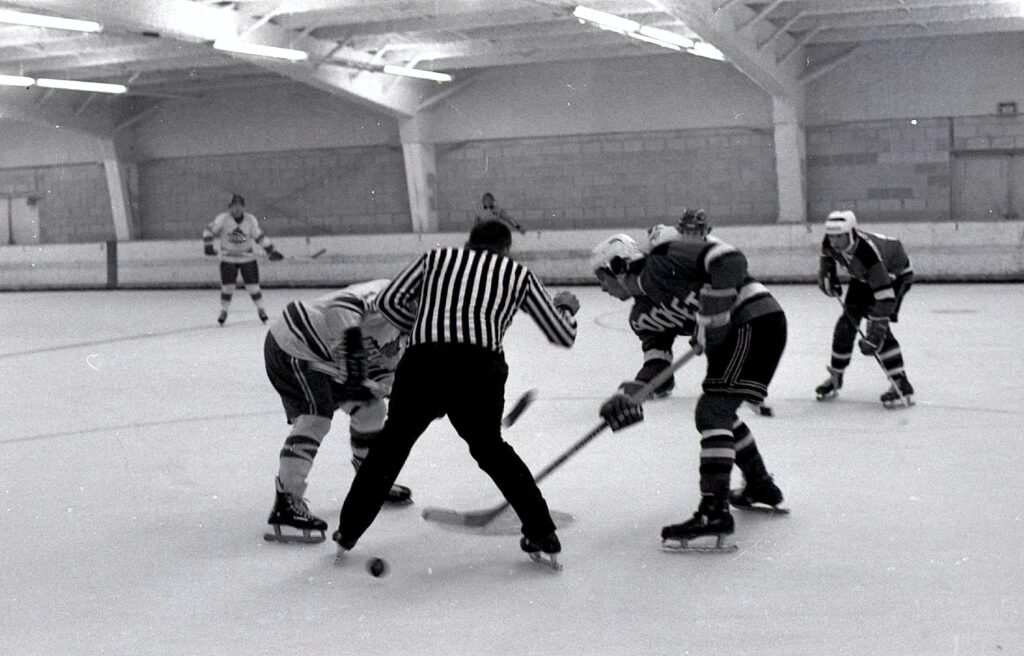
Jeff Mancheni | Spokane Rockets
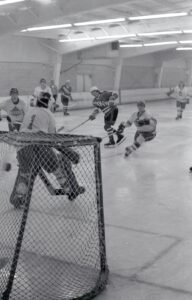 Jeff Mancheni played two seasons for the Rockets after spending a year studying at the University of Denver. Mancheni loved playing for his hometown Rockets because of the friendships he built. He still sees almost a dozen of the guys he grew up playing with.
Jeff Mancheni played two seasons for the Rockets after spending a year studying at the University of Denver. Mancheni loved playing for his hometown Rockets because of the friendships he built. He still sees almost a dozen of the guys he grew up playing with.
“I was glad to play for the Rockets. I had a great time and we represented the city well,” he said. “It’s something that I will never forget.”
Mancheni was a mobile defenceman who liked playing a physical style without taking undisciplined penalties.
“I never got kicked out of a game,” said Mancheni, who loved blocking shots. “Back then when you played the style of game that was commonplace in the KIJHL, that was kind of a rare thing. I was happy about that.”
He also chipped in offensively for a roster loaded with speed and physicality. It was a style most KIJHL teams play and the fans loved.
Bob Sherette | Valley Kings captain | 1971-72
Sherette moved to Spokane from East Grand Forks, Minnesota when he was 18 and became the captain of the Valley Kings. Wearing the ‘C’ was a highlight for Sherette who had never been a captain before.
“It gave a lot of responsibility trying to keep the whole thing uniform,” he said.
An offensive centre from East Grand Forks, Minnesota, Sherette put up points for the Valley Kings using his speed and going to the net.
While he was one of the Valley Kings’ point producers, it was more challenging to contribute because the opposition paid more attention to him with two players nearby. He also found playing at the junior level more physical compared to high school hockey. There were more fights in the KIJHL.
“It was a totally different experience than playing high school hockey,” said Sherette.
Another aspect he enjoyed from his only season of junior hockey was traveling to Trail, Nelson and Kimberley for games.






















